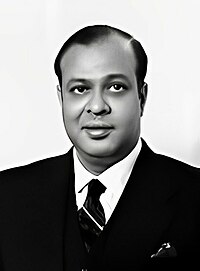Mohammad Ali Bogra | |
|---|---|
মোহাম্মদ আলী বগুড়া محمد علی بوگرا | |
 Bogra in 1955 | |
| 3rd Prime Minister of Pakistan | |
| In office 17 April 1953 – 12 August 1955 | |
| Monarch | Elizabeth II |
| Governors General | Malik Ghulam Muhammad Iskandar Ali Mirza |
| Preceded by | Khawaja Nazimuddin |
| Succeeded by | Muhammad Ali |
| 3rd & 7th Minister of Foreign Affairs | |
| In office 13 June 1962 – 23 January 1963 | |
| President | Muhammad Ayub Khan |
| Deputy | S.K. Dehlavi (Foreign Secretary) |
| Preceded by | Manzur Qadir |
| Succeeded by | Zulfikar Ali Bhutto |
| In office 24 October 1954 – 12 August 1955 | |
| Deputy | J.A. Rahim (Foreign Secretary) |
| Preceded by | M. Zafarullah Khan |
| Succeeded by | Hamidul Huq Choudhury |
| Minister of Defence | |
| In office 17 April 1953 – 24 October 1954 | |
| Deputy | Akhter Husain (Defence Secretary) |
| Preceded by | Khawaja Nazimuddin |
| Succeeded by | General Ayub Khan |
| Pakistan Ambassador to Japan | |
| In office 1959–1962 | |
| President | Ayub Khan |
| Preceded by | Omar Hayat Malik |
| Succeeded by | K. M. Sheikh |
| Pakistan Ambassador to the United States | |
| In office November 1955 – March 1959 | |
| President | Iskander Mirza |
| Preceded by | Syed Amjad Ali |
| Succeeded by | Aziz Ahmed |
| In office 27 February 1952 – 16 April 1953 | |
| Governor General | Malik Ghulam |
| Preceded by | A. H. Isphani |
| Succeeded by | Amjad Ali |
| High Commissioner of Pakistan to Canada | |
| In office 1949–1952 | |
| Governor General | Khawaja Nazimuddin |
| Pakistani Ambassador to Burma | |
| In office 1948–1949 | |
| Governors General | Muhammad Ali Jinnah (1948) Khawaja Nazimuddin (1948–1949) |
| President of Pakistan Muslim League | |
| In office 17 April 1953 – 12 August 1955 | |
| Preceded by | Khawaja Nazimuddin |
| Succeeded by | Muhammad Ali |
| Personal details | |
| Born | Syed Mohammad Ali Chowdhury 19 October 1909 Barisal, Eastern Bengal and Assam, British India |
| Died | 23 January 1963 (aged 53) Dacca, East Pakistan, Pakistan |
| Resting place | Bogra Nawab Palace, Bogra, Rajshahi, Bangladesh |
| Citizenship | British Raj (1909–1947) Pakistan (1947–1963) |
| Political party | Pakistan Muslim League |
| Spouse(s) | Hameeda Begum[1] Aliya Begum[1] |
| Parent |
|
| Relatives | Nawab Ali Chowdhury (grandfather) Hasan Ali Chowdhury (uncle) Syeda Ashiqua Akbar (cousin) |
| Alma mater | University of Calcutta (B.A.) |
| Cabinet | Ayub administration |
Syed Mohammad Ali Chowdhury Bogra[a] (19 October 1909 – 23 January 1963) was a Pakistani Bengali politician, statesman, and a diplomat who served as third prime minister of Pakistan from 1953 to 1955. He was appointed in this capacity in 1953 until he stepped down in 1955 in favour of Finance Minister Muhammad Ali.[2][3][4][5][6][7][8][9]
After his education at the Presidency College at the University of Calcutta, he started his political career on Muslim League's platform and joined the Bengal's provincial cabinet of then-Prime Minister H. S. Suhrawardy in the 1940s. After the independence of Pakistan in 1947, he joined the foreign ministry as a diplomat and briefly tenured as Pakistan's ambassador to Burma (1948), High Commissioner to Canada (1949–1952), twice as ambassador to the United States, and as ambassador to Japan (1959–1962).[10]
After he was recalled in 1953 from his services to Pakistan from the United States, he replaced Sir Khwaja Nazimuddin as Prime Minister in an appointment approved by then-Governor-General Sir Malik Ghulam. His foreign policy strongly pursued the strengthening of bilateral relations between Pakistan and the United States, while downplaying relations with the Soviet Union. He also pushed for a stronger military to achieve peace with India and took personal initiatives to prioritize relations with China. At home front, he successfully proposed the popular political formula that laid the foundation of the constitution in 1956 which made Pakistan a federal parliamentary republic. Despite his popular initiatives, he lost his support to then-acting governor-general Iskandar Ali Mirza who re-appointed him as Pakistani Ambassador to the United States which he served until 1959.
In 1962, he joined President Muhammad Ayub Khan's administration as the Foreign Minister of Pakistan until his death in 1963.
- ^ a b Balouch, Akhtar (8 September 2015). "The Pakistani Prime Minister who drove a locomotive". Dawn.
- ^ "Former Prime Ministers". Prime Minister's Office Islamabad. Retrieved 1 March 2015.
- ^ Mir Monaz Haque. "Mohammed Ali Bogra". bogra.org. Retrieved 1 March 2015.
- ^ Burki, Shahid Javed (5 March 2015). "Mohammed Ali Bogra". Encyclopædia Britannica, Inc. Retrieved 1 March 2015.
- ^ Kalim Bahadur (1998). Democracy in Pakistan: Crises and Conflicts. New Delhi: Har-Anand Publications. p. 36. ISBN 9788124100837. Retrieved 1 March 2015.
- ^ "Chaudhury, Mohammad Ali". Banglapedia. Retrieved 18 August 2021.
- ^ বাঙালি মোহাম্মদ আলী বগুড়া ছিলেন ২ বার পাকিস্তানের প্রধানমন্ত্রী. usbnews24.com (in Bengali). Archived from the original on 18 August 2021. Retrieved 18 August 2021.
- ^ বগুড়ার কৃতি সন্তান অবিভক্ত পাকিস্থানের প্রধানমন্ত্রী মরহুম মোহাম্মদ আলী চৌধুরী. বগুড়া লাইভ. 12 March 2019. Retrieved 18 August 2021.[permanent dead link]
- ^ Syed Hamde Ali (20 October 2009). "Mohammed Ali of Bogra". The Daily Star. Archived from the original on 4 February 2015. Retrieved 13 February 2015.
- ^ "Ambassador of Pakistan Embassy, Tokyo". Embassy of Pakistan in Tokyo. Retrieved 27 April 2022.
Cite error: There are <ref group=lower-alpha> tags or {{efn}} templates on this page, but the references will not show without a {{reflist|group=lower-alpha}} template or {{notelist}} template (see the help page).